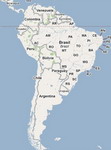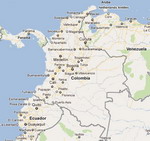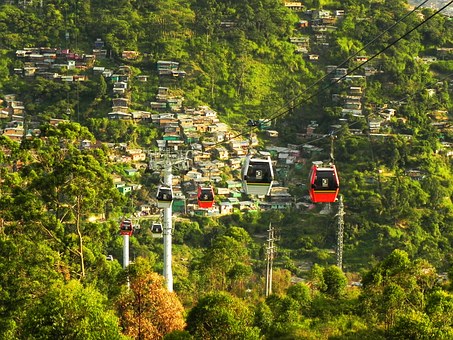|
Search
this site


View
map of South America

View
map of Colombia
Copyright © All World
Vacation Station
|
 |



Bogota
Colombia: Enjoy An Andes Vacation Experience
Carnaval
De Barranquilla - High Dose of Excitement
Cartagena,
Colombia - 4 Ways To Visit Before Leaving Home
Colombia
Travel Advice For Visitors
Colombian
Coffee - The Best in The World
Take
Spanish lessons and visit Colombia
Travel
the Colombia Coast the Green Way with Las Pleyades (Santa Marta)
Traveling
to Medellin, Colombia
When
Colombia Calls, You Travel - Colombia Travel Information
Colombia
Travel Advice For Visitors by Tom Fisher
Colombia travel advice seekers
should be prepared for a sensory assault that will entice and thrill visitors.
Colombia has a great deal of diverse attractions and activities, with two
coasts facing the Pacific Ocean and the Caribbean Sea. It has everything
from deserts to glaciers, steaming rainforests, secluded islands, pristine
beaches and modern cities.
Western tourists and visitors
will probably want to fly in by plane to Bogota,
which is the capital. Depending on the itinerary, it's also possible to
hop over by plane to other destinations like Cartagena,
Cali
or San Andres. Visitors entering from Ecuador or Venezuela can come in
by bus or car, and those coming from Panama can take a boat.
Safety-wise, visitors don't
have all that much to worry these days. Metropolitan zones are about the
same as any other city in Central & South America. Visitors should
take standard precautions such as avoiding a tough neighborhood after dark
and not heading off solo into isolated regions.

The real draw for visitors
is the variety of the destinations and the natural beauty. The choices
range from Bogota's flesh pots to the Salsa clubs in Cali
and the Carnival in Barranquilla,
among others. Visitors can spend many days & weeks enjoying all this,
not to mention the tropical rainforests, majestic humpback whales in the
Pacific, and the pristine beaches and coral reefs near Caribbean coast
islands like San Andres, Santa Catalina and Providencia.
Speaking of which, scuba
diving is one of the premier attractions here that draw in large number
of visitors from all over the world. As mentioned above, visitors can explore
the underwater marine life on both the Caribbean and Pacific coasts. There
are some destinations on each coast that are famed for their excellent
dive spots.
San Andres and Providencia
probably offer the most popular dive spots on the Caribbean coast. Isla
Gorgona and Malpelo Island on the Pacific Coast are quite famous and popular
among both tourists and expert divers. Visitors need to choose from amongst
these locations based on their taste for adventure, diving skill and travel
logistics.
So for example, a visitor
planning to head out to San Andres can reach it directly by air even though
it is 700 km away from the mainland. Another plus point here is that since
the coral reef is really long, tourists and divers can enjoy the dive spots
and attractions of Providencia & Santa Catalina along with San Andres.
The biggest attraction is,
of course, the famous 'sea of seven colors' which is a good indicator of
the diversity of marine life here.
Pacific coast divers at spots
near Malpelo Island or Isla Gorgona tend to be more adventurous. A trip
here involves a flight to Guapi from Cali, followed by a boat ride to the
island. Crystal clear and cold waters await divers, along with whale sharks
and hammerheads. Isla Gorgona is an especially tourist-friendly place with
nature tours, whale watching and beaches, and a history as an old prison
island like Alcatraz.
To end this healthy dose
of Colombia travel advice on a general note, visitors are advised to consider
longer stays. It's not possible to drive-thru or jump from one airport
to another over a quick weekend. Every destination has to be considered
as a mini vacation by itself that needs to be explored and enjoyed at its
own sweet pace.
Top
|
| About the Author: If you
want more great tips try my new Colombia travel advice site www.traveladvice.tv/south-america/colombia |
 
| Santiago
de Cali, simply referred to as Cali,
is a city in western Colombia and the capital of the Valle del Cauca Department.
With a population of 2.5 million, Cali is the second largest city in the
country. It has one of the fastest growing economies and infrastructure
in the country because of its geographical location. The city was founded
on July 25, 1536 by the Spanish conquistador Sebastián de Belalcázar.
Browse
accommodation in Cali
|

View
map of Cali
|
  
| Ibagué
is the capital of the department of Tolima in Colombia. It is situated
1,285 m (4,216 ft) above sea level, on the eastern slopes of the Cordillera
Central between the Chipalo and Combeima rivers, tributaries of the Coello
River. It is on the road from Bogotá to Cali near the high mountain
pass known as "La Línea" ("The Line") which connects the interandean
valleys of Magdalena and Cauca rivers; as a result, the city has become
an important commercial center and road transport hub. The fertile surrounding
countryside produces coffee, cacao, tobacco, sugarcane, and rice. Ibagué
is widely regarded as the "Musical City of Colombia" due to its long tradition
in offering advanced musical education and its rich schedule of musical
events during the year.
Browse
accommodation in Ibagué
|

View
map of Ibague
|



| Quimbaya
is a town and municipality in the western part of the department of Quindío,
Colombia. It is 20 km northwest of the departmental capital Armenia. The
name of the city derives from the name of the Precolumbian culture that
inhabited the area, the Quimbaya civilization. Quimbaya is bounded to the
north and west by the department of Valle del Cauca, with La Vieja River
forming the western limit.
The National Agricultural
and livestock Park (Spanish: El Parque Natural De La Cultura Agropecuaria),
PANACA, is located 7 km west of the main township. The 47 hectare park
contains a variety of interactive exhibits, including more than 200 species
of animals. Along with the National Coffee
Park in Montenegro, the theme park is one of major tourist attractions
of the department.
Browse
accommodation in Quimbaya
|

View
map of Quimbaya
|

Colombian
Coffee - The Best in The World by Wesley Johnson
Thanks to an aggressive marketing
campaign started in the 1980s, Colombian coffee is now almost synonymous
with the popular image and logo of Juan Valdez and his donkey trekking
through the Colombian mountains.
However, with the advent
of specially grown coffees, environmentally sustainable coffees, organic
and fair trade coffees, Colombia is working hard to upgrade its image and
become the world's premiere source for high-quality, gourmet coffees.

Types of Beans Grown in
Colombia
Almost all the coffee beans
grown in Colombia are 100 percent Arabica beans. The Arabica bean is low
in caffeine and acidity and are best grown in rugged, mountain terrains.
The Arabica bean is the most
popular bean in North America, thanks to its superior taste and how well
it lends itself to a classic, American medium roast.
Washed Arabica
Colombian coffee beans go
through a washing process. This wet processing purifies the beans, takes
out some of the acidity and gives the coffee a stronger aroma and richer
taste, making it ideal for the coffee lover.

Coffee Growing Regions
in Colombia
The two largest coffee-growing
areas in Colombia are the central region including Armenia, Manizales
and Medellin and the eastern,
more mountainous area closer to Bogota
and Bucaramanga.
Major Carriers of Colombian
Coffee
Most standard, store brands
will have Colombian coffee. However, many will also blend these with beans
from Brazil, Africa or other Latin countries. To ensure a brand is 100
percent Colombian, look for the Juan Valdez logo and 100 percent Colombian
certification.

Organic and Fair Trade
Farming in Colombia
Thanks to consumer demands,
a number of coffee plantations in Colombia are working toward a triple
seal certification. The Triple Seal is the highest level an organic farmer
can obtain and requires first that the farmer meets the USDA organic cultivation
standards.
Next, the grower must create
a natural shade grown coffee plantation. So, instead of relying on artificial
shades or screens, the grower must plant and grow a natural, plant-based
canopy.
Finally, the last seal is
granted by the Smithsonian Migratory Bird Center and Rainforest Alliance.
This seal is dependent on how the coffee plantation affects the natural
habitat around it both now and in the future.
Many Colombian coffee growers
are also moving toward fair trade practices to stay competitive with the
international coffee market. Remember, coffee is a volatile commodity,
so staying in tune and on top of customer demands is crucial to growers
and manufacturers remaining competitive in the java business.

top
|
| About the Author: For additional
informative details on coffee and enticing flavors that explode your taste
buds, please visit http://www.coffeetryst.com, a popular site with insights
on coffee options, such as flavored decaf coffee, gourmet coffee gift baskets,
and many more! |


|















